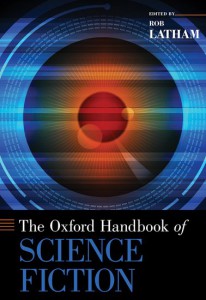The Oxford Handbook of Science Fiction
Sous la direction de Rob Latham


Moyenne des votes : ![]()
| 0 | vote | |
| 0 | vote | |
| 0 | vote | |
| 0 | vote |
Votre vote : -
Description de l'ouvrage:
• Encompasses the genre's development across a wide array of media that includes literature, film, comics, and television
• Provides a groundbreaking and vitally important contribution to the intersecting fields of science fiction, technoculture, and cultural studies
• Covers seminal works by writers such as Ray Bradbury, Jules Verne, H.G. Wells, Hugo Gernsback, Margaret Atwood, among others
The Oxford Handbook of Science Fiction attempts to descry the historical and cultural contours of SF in the wake of technoculture studies. Rather than treating the genre as an isolated aesthetic formation, it examines SF's many lines of cross-pollination with technocultural realities since its inception in the nineteenth century, showing how SF's unique history and subcultural identity has been constructed in ongoing dialogue with popular discourses of science and technology. The volume consists of four broadly themed sections, each divided into eleven chapters. Section I, "Science Fiction as Genre," considers the internal history of SF literature, examining its characteristic aesthetic and ideological modalities, its animating social and commercial institutions, and its relationship to other fantastic genres. Section II, "Science Fiction as Medium," presents a more diverse and ramified understanding of what constitutes the field as a mode of artistic and pop-cultural expression, canvassing extra-literary manifestations of SF ranging from film and television to videogames and hypertext to music and theme parks. Section III, "Science Fiction as Culture," examines the genre in relation to cultural issues and contexts that have influenced it and been influenced by it in turn, the goal being to see how SF has helped to constitute and define important (sub)cultural groupings, social movements, and historical developments during the nineteenth, twentieth, and twenty-first centuries. Finally, Section IV, "Science Fiction as Worldview," explores SF as a mode of thought and its intersection with other philosophies and large-scale perspectives on the world, from the Enlightenment to the present day.
À propos de l'auteur :
Edited by Rob Latham, Professor of English, University of California, Riverside Rob Latham is the author of Consuming Youth: Vampires, Cyborgs, and the Culture of Consumption and a senior editor of the journal Science Fiction Studies. He is also a member of the editorial boards of The Journal of Science Fiction Film and Television and The Journal of the Fantastic in the Arts.
Voir le site internet de l'éditeur Oxford University Press
> Sur un thème proche :
Robots That Love (2025)
Artificial Amours in Myth, Folklore, Literature, Popular Culture and the Real World
Sujet : Genre > Science Fiction
The Future Was Now (2025)
Madmen, Mavericks, and the Epic Sci-Fi Summer of 1982
Sujet : Genre > Science Fiction
Feminist Posthumanism in Contemporary Science Fiction Film and Media (2025)
From Annihilation to High Life and Beyond
Dir. Julia A. Empey
Sujet : Genre > Science Fiction
Societies in Space (2025)
Essays on the Civilized Frontier in Film and Television
Dir. Gary Westfahl
Sujet : Genre > Science Fiction
The Science Fiction Film in Contemporary Hollywood (2025)
A Social Semiotics of Bodies and Worlds
Sujet : Genre > Science Fiction
Amazing Worlds of Science Fiction and Science Fact (2025)
de Keith Cooper
Sujet : Genre > Science Fiction
The New Routledge Companion to Science Fiction (2024)
Dir. Mark Bould, Andrew Butler et Sherryl Vint
Sujet : Genre > Science Fiction
The Trans and Non-Binary Hero's Journey (2024)
Quests for Empowerment in Science Fiction and Fantasy
de Valerie Estelle Frankel et Dean Leetal
Sujet : Genre > Science Fiction